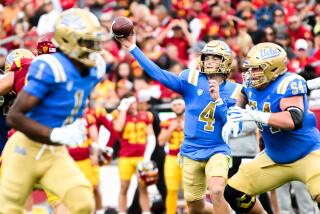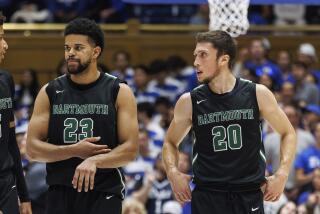Pro Football : Heyward Needs Lawyer to Wake Up NFL
- Share via
PHOENIX — The National Football League, in collusion with the National Collegiate Athletic Assn., is still forcing some of the nation’s best young players to threaten lawsuits if they want to get into pro ball.
Four years of college are no longer enough if a player’s college coach wants him to stick around for five years, the evidence of another case showed again this week.
Pitt running back Craig (Ironhead) Heyward was left in limbo Thursday as the NFL ended its annual spring meetings.
The scouts say that Heyward may have been the best back in college last season. And now after four years at Pittsburgh, he wants to play pro ball. The pros, moreover, would like to have him, but it is by no means automatic that they will include him in their draft next month.
As a sophomore, Heyward was red-shirted. He practiced with the varsity but was held out of all games--leaving him with college eligibility into a fifth season.
College teams do this often, for many reasons but mostly to give the school a stockpile of more mature football talent.
Often, however, the redshirt procedure is unfair to the individual player. After four years in college, he may want to get on with his career, as Heyward does now.
But Heyward was told that, even though his college class will graduate this spring, he had to petition the NFL and hope for the best.
So he did, and he’s still hoping, having received no reply.
He is the latest to discover that the NFL, wishing to keep peace with college coaches, honors their redshirt rules.
Up to a point, anyway.
The pros have a way of backing off and giving in if the player hires a lawyer and threatens to go to court, where the entire structure of the NFL draft might come tumbling down.
Heyward hasn’t hired a lawyer yet, but he’s close.
It should be obvious that this is the wrong way to run a railroad. Intimidating a young college student, as the NCAA and NFL do in these cases, is at least unsportsmanlike, and at worst unconstitutional.
Bill Walsh of the San Francisco 49ers, had another idea.
“We should come up with a better (rule),” he said. “Some day, if we don’t, (the courts will) allow a high school graduate to declare himself a pro any time. And that would be harmful to most people. Only the few (outstanding players) would benefit.”
Heyward’s and the other cases suggest that it may be getting late for the NFL to voluntarily alter the formula in some such way, as Walsh recommends.
The competition committee probably should have been ready with a proposal this week, and the league should have acted on it.
Eight years ago, when Al Davis moved the Raiders from Oakland to Los Angeles, the NFL’s other owners professed to be shocked by Davis’ lack of loyalty to Oakland fans.
This week, by contrast, the same sentiment was absent when the league overwhelmingly approved the St. Louis Cardinals’ move to Phoenix, 26-0.
Eight years ago, almost every NFL owner said the Raiders owed it to their Oakland fans to stay put. This week, no owner suggested that the Cardinals owed their St. Louis fans anything.
Are there degrees of loyalty? Are there differences between the NFL fans of one city and another?
There sure are.
In both instances, the difference is whether the town has a winner to cheer for or a loser to cry about:
--In Oakland, Davis gave Raider fans a colorful, winning team. They supported that team with capacity crowds not out of any abstract sense of loyalty but because a colorful NFL winner is an extraordinary community magnet.
--In St. Louis, the owner of the Cardinals, Bill Bidwill, presided over a frequent loser. The Cardinals made the playoffs occasionally before Bidwill fired Don Coryell in 1977, but since then, they’re well under .500.
It is a commentary on the crowd appeal of pro football that until 1985, Bidwill’s bunch played to 95% of capacity in St. Louis for 25 consecutive years.
The wonder isn’t that Bidwill’s fans finally gave up but that they were patient for so long.
There is no reason to believe that the Raiders, in the same area with the San Francisco 49ers, would have drawn 95% of capacity all those years if they’d had Bidwill as their owner instead of Davis.
More to Read
Go beyond the scoreboard
Get the latest on L.A.'s teams in the daily Sports Report newsletter.
You may occasionally receive promotional content from the Los Angeles Times.










